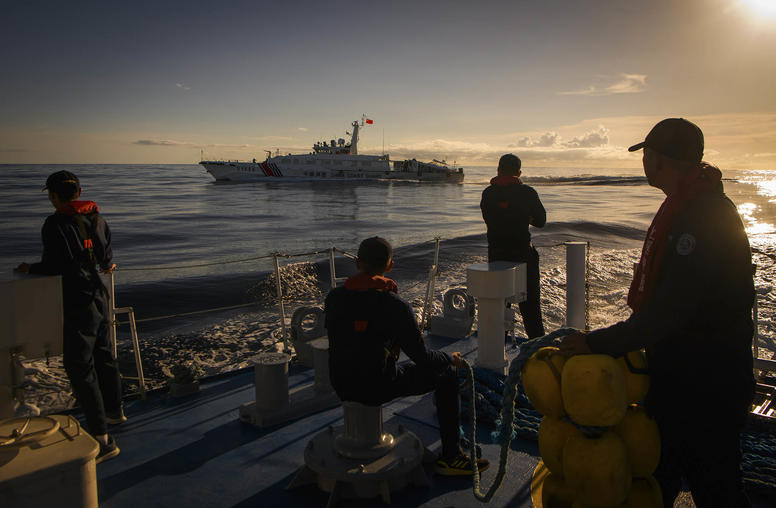Philippines: Seizing the Opportunity Offered by the Bangsamoro Transition Extension
A strong partnership between the Philippine government and former rebels is key to the success of the two-track peace process.
Editor’s Note: On October 28, 2021, Rodrigo Duterte, then president of the Philippines, signed into law a three-year extension of the transition period of the Bangsamoro Autonomous Region of Muslim Mindanao. The region’s first parliamentary elections are now scheduled for May 2025, alongside the national elections. In 2021, the Mindanao Peoples Caucus (MPC) actively campaigned for the extension of the transition period to provide more time for the Bangsamoro Transition Authority and the Philippine government to fully implement and deliver the commitments they made in the 2014 peace agreement between the national government and the Moro Islamic Liberation Front. The agreement grants greater political autonomy to the southern Mindanao region.

In this article, Mary Ann M. Arnado, secretary-general of the MPC, examines the challenges and opportunities as the BTA faces an additional three years to implement the two-track peace process.
Considering the magnitude and complexity of its mandate, the original three-year transition period, from 2019 to 2022, was simply too short for the BTA to meet the timelines enshrined in the Bangsamoro Organic Law (BOL) for achieving key political, legal and normalization milestones.
Hopes for reaching these milestones soared when the BTA secured a three-year extension from the national government in October 2021. Bangsamoro Autonomous Region in Muslim Mindanao (BARMM) Chief Minister Ahod Ebrahim said the extension “puts us in a better position to ensure that the provisions and agreements in the GPH-MILF [Government of the Philippines–Moro Islamic Liberation Front] peace process are properly implemented.”
There are those who argue that the BTA has not delivered results at the community level. A feeling of suspended dissatisfaction pervades ordinary Bangsamoro communities as the promises made during the plebiscite campaign for the ratification of the BOL remain unfulfilled. Despite this feeling of discontent, there is a recognition in the community that the socioeconomic and political problems in the Bangsamoro cannot be solved overnight and that more vigorous work by and cooperation among all stakeholders is required.
Persistent Challenges
In the first three years of the BTA’s existence, the many problems that beset and continue to harry the Bangsamoro territory have become increasingly clear. The national government’s protracted war with militant and extremist armed groups — a war driven by polarized political and religious ideologies — and recurrent violent clan conflicts in rural hot spots undermine security and stability. Then there are the issues of widespread poverty, lack of economic opportunities, rampant corruption, proliferation of illegal drugs and intrusion into ancestral domains of indigenous peoples within the Bangsamoro core territory. There is also a growing, gnawing disgruntlement among the Bangsamoro communities over the delay in the delivery not only of the so-called peace dividends, including the much-ballyhooed economic assistance package for the decommissioned combatants of the Bangsamoro Islamic Armed Forces as part of the normalization track, but also the general socioeconomic benefits of peace for all Bangsamoro people.
These problems and issues surfaced in the participatory action research, focus group discussions, key informant interviews and validation workshops that the MPC conducted in 2021 in various places in the autonomous region in the southern Philippines.
Despite these challenges, the peace accord signed by the Philippine government and the MILF in 2014 has held and the BTA is undeterred. If anything, the BTA’s request for an extension of the transition period up to 2025 reflects an undiminished confidence in its ability to meet the challenges of autonomous governance. For the BTA, these challenges may be formidable, but they are not insurmountable.
The BTA cannot be solely blamed for the slow enactment and implementation of laws needed to strengthen its institutional capacity, such as the Local Government Code, Revenue Code, Electoral Code and the Indigenous Peoples Code, prescribed by the BOL or the delays in the delivery of public services. For one, the failure by former Philippine President Rodrigo Duterte’s administration to provide the BTA with the necessary funds significantly hindered the interim government’s ability to carry out its work. In fact, during its first year, the BTA had to content itself with overseeing programs and projects that were already funded in the national budget for its predecessor, the Autonomous Region in Muslim Mindanao.
A New Political Reality
Appropriations may not be the biggest challenge that the BTA will face in the aftermath of the national elections in May that resulted in a new president and Congress. This is because the peace agreement and the BOL already provide for automatic budgetary allocations for the autonomous region. Thus, the BTA need not beg for funds from a Congress that is notorious for dragging its feet, bickering and grandstanding, even on certified legislative priorities.
The post-election composition of the BTA could be reconfigured though, depending on the choice of the newly elected president of the Philippines, Ferdinand Marcos Jr. A possible rearrangement may not augur well for the BTA in terms of continuity of development plans and projects already laid out. An equally compelling point of interest is the lay of the post-2022 local election landscape in the BARMM, specifically, the continued stranglehold of traditional political clans on power and politics.
This concern emerged during a regional dialogue on peacebuilding and conflict prevention conducted in March 2022 in Davao City with various sectoral and civil society representatives from the BARMM. Participants feared that the electoral victory of the elite clans that dominate politics in local government would effectively negate equal representation in the political structure and dynamics in the BARMM, from the interim Parliament down to the constituent local government units. These concerns were validated when the elite won the elections in May. This has serious implications for the goals of inclusive growth, equitable development and political reform, among others, through the extended transition period and beyond.
Another major consideration for the BTA in the extended transition period pertains to the capacity of the interim government to meet the challenges of effective political and moral governance, the latter touted as the cornerstone of the BTA administration. The previous three years may have been too short a period for the MILF (whose members dominate the BTA, at least in terms of numbers) to adjust to the demands of legislative work. Ebrahim, the BTA’s chief minister, has admitted that the fundamental challenge for the MILF is how to shift their mindset from that of rebels to legislators and bureaucrats. The ministers and even the government bureaucracy itself must prove their ability to effectively govern, manage intergovernmental relations and meaningfully represent all Bangsamoro communities.
Issues the BTA Should Prioritize
There is widespread concern across the BARMM over how the BTA will navigate the abovementioned challenges. From communities, peace advocates and women to civil society organizations (CSOs), Bangsamoro constituents have urged the BTA to prioritize urgent community needs. Among the most pressing are the following:
- Enacting the Indigenous People’s Law and the immediate delineation of the ancestral domain of non-Moro indigenous peoples;
- Enacting the Bangsamoro Labor Code, which involves the participation of the labor sector, along with legislation outlawing labor contractualization and child labor;
- Instituting transparency mechanisms in the use of the Block Grant, Social Development Fund and the Normalization Trust Fund so that civil society can access information regarding the budgeting and spending of public funds;
- Adopting moral governance policies, ethics and practices in all BARMM ministries, offices, bureaus and local government units through the establishment of an anti-corruption office;
- Promoting substantial and meaningful participation of women as leaders in Parliament, the cabinet and normalization mechanisms as well as the provision in the Electoral Code of a mandatory quota for the nomination of female party candidates;
- Enhancing the participation of CSOs and community-based organizations in the implementation of plans and programs under the normalization track of the GPH-MILF peace agreement;
- Increasing the number of women to be included in the next phases of decommissioning of former combatants; and
- Including female representatives in the Bangsamoro Normalization Trust Fund.
The Road Ahead
A multis-ectoral approach with equitable representation of women, indigenous peoples, Christian settlers, internally displaced persons and marginalized sectors will be essential for the BTA to succeed. Such representation must not be tokenism, but a genuine, legitimate and active engagement by the various sectors in the important work of institution building during the extended transition period.
CSOs, in particular, realize that they must continue to contribute their expertise throughout the extended transition period by facilitating vibrant, dynamic and inclusive deliberations in the BTA Parliament and the different ministries in the BARMM so that people can freely and confidently express their views. Quite clearly, CSOs need to recalibrate their capacities to incorporate inclusive growth and sustainable development, good governance and electoral reform and post-COVID-19 recovery programs.
It is also vital that the communities have a clear understanding of the transition process and a road map so that they are able to effectively participate. The MILF, in particular, is lucky to have been given three more years to implement its avowed solution to the Bangsamoro problem. The original term of the transition period should have afforded the MILF’s leaders adequate knowledge and abundant experience on how to establish their envisioned autonomous Bangsamoro government that will truly serve the best interests of the Moro people.
As parties to the peace agreement, a strong partnership between the national government and the MILF will be most critical for the success of the extended transition period. To the credit of both parties, despite the setbacks in normalization and funding and those caused by the COVID-19 pandemic, they have remained committed to narrowing the gaps and reconciling varying interpretations of how to implement specific provisions of the peace accord. The international community has facilitated this process through its active involvement in and monitoring of every aspect of the implementation of the peace agreement.
An all-hands-on-deck approach is now required to reap the benefits of the three-year extension of the transition period of the BARMM. It is time to roll up the sleeves, get to work and show not just palpable results but very good results.



